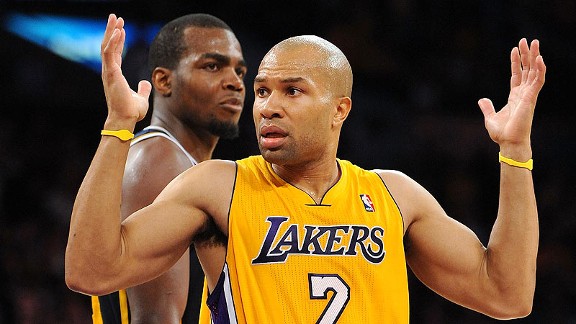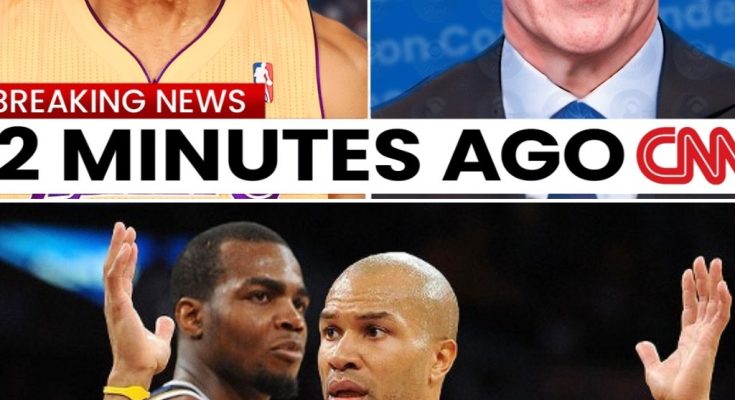He was the steady heartbeat in a storm — five championships, a veteran’s calm, the man Kobe trusted to catch and shoot with seasons hanging by a thread. Derek Fisher built a career on timing: arriving at the arc just as the pass whistled through the air, squaring his shoulders while 20,000 hearts held their breath. What no one saw coming was the moment his timing failed him — not on the court, but in life.

The turn began in October 2015, after the final page of his playing career turned and a glossy new chapter promised power: head coach of the New York Knicks, a $25 million bet that his championship DNA would translate to leadership on the sideline. New suit. New salary. New authority. And then — a fault line.
He was dating Gloria Govan, the ex-wife of former teammate Matt Barnes. In the NBA’s unwritten code, there are fouls the referees can’t whistle. You don’t cross a teammate’s family line. The story leapt from rumor to breaking news in a single weekend, reaching its fever point in Redondo Beach, where a confrontation between Barnes and Fisher detonated into headlines and humiliation. Worse still, Fisher had been around Barnes’s twin sons — a detail that made the optics brutal and the locker rooms louder. For players who once read Fisher as “leader,” the caption underneath his name suddenly changed. Quiet side-glances. Shrugs. The rolling eyes that tell you a room is done believing.

Publicly, Fisher insisted his personal life wasn’t the reason the Knicks fired him the following February. Privately, everyone understood a simpler truth: it’s impossible to command men whose respect you’ve lost. Systems stop sticking. Chalk talks sound hollow. And the record — 23–31 in 2015–16 — offered the front office an easy exit ramp. When the news broke, Barnes didn’t just celebrate. He trolled. The sting wasn’t the losing—it was the laughing.
But even that wasn’t bottom. In June 2017, before dawn on the 101 in Los Angeles, a Cadillac Escalade flipped and skidded upside-down across the freeway. Miraculously, no one died. Police said Fisher had been driving under the influence; he later pled no contest. The image — not a box score, not a ring ceremony, but an SUV on its roof — burned away whatever remained of his old halo. Coaches preach accountability; fathers preach responsibility. That morning, both sermons rang false.
This is where some men begin the climb back — the apology tour, the foundation work, the slow, public rebuilding of a name. Fisher never found that rhythm. He offered statements, not a crusade. He survived the headlines but surrendered the narrative. In a league where second chances are as common as 10-day contracts, the silence that met his phone was its own verdict. TV sets filled with familiar retired faces; his never showed. Assistant benches churned; his name never surfaced. Persona non grata is not a title you get in a day. It’s a slow decree, handed down by a thousand small no’s.
What makes his fall so jarring is the contrast. The man known for the .4 miracle in San Antonio. The steady hand beside Kobe when dynasties are supposed to wobble. That Derek Fisher was a picture of composure and conviction. This Derek Fisher became a case study: how fragile authority is when character goes missing from the huddle.

There were victims in the echoes of those choices. A teammate who felt a line had been crossed and his children put in the middle of a public feud. Drivers on a freeway who might have been widowed by a moment’s recklessness. A Knicks locker room searching for a voice and hearing static. Young fans who learned that clutch isn’t the same as character — that a fourth-quarter legend can still be a fourth-rate decision-maker off the clock.
And yet, even here, the story refuses to resolve into simple villain and simple verdict. The relationship Fisher risked everything for didn’t fizzle; it forged forward and became a marriage years later. The Barnes feud, once nuclear, cooled into something like detente. Life is messy, even when the headlines beg for neatness. But the league is not a confessional; it’s a marketplace. Trust is currency, and Fisher spent his faster than he could earn it back.
The psychology, if you squint, is tragically familiar. The same audacity that lets a guard rise into a shot with a city’s pulse in his palm can curdle into entitlement when the cheers fade. Players live for years inside a bubble of “we’ve got your back,” and then one day the bubble pops. You’re not a captain. You’re a cautionary tale. You look up and the only room you can command is a high-school gym, the only bright lights are from a local TV truck, and the only applause is polite. You went from Madison Square Garden to metal bleachers, from charter flights to yellow buses, from a huddle of millionaires to a circle of teenagers who know your name from memes, not from miracles.
Character is a slow, invisible stat. You don’t get to flash it on a scoreboard. You build it in private and you spend it in public. Fisher’s ledger flipped. The betrayal of a brotherhood line. The DUI that could have shattered families. The inability to separate the personal from the professional, to do the hard, boring work of modeling what you demand. The cost wasn’t just jobs and checks; it was belief. And once belief leaves a room, you can feel the temperature drop.
So what remains? A reel of clutch makes that still thrills. A résumé that will always read “five-time NBA champion.” And a warning label stamped across the whole arc: not all downfalls are a single fall. Some are a staircase, missed step by missed step, until you realize the lobby you’ve reached isn’t a lobby at all — it’s outside.
Maybe redemption, in its small and untelevised way, looks like showing up for teenagers at 3:30 p.m., running shell drills and teaching closeouts, owning the lessons you learned too late. Maybe it looks like speaking to rooms about the night on the 101 and the difference between talent and wisdom. Maybe it’s the long, patient rebuilding of a life that no longer needs an arena to have meaning.
But the legend we’re left with today is simpler, colder, and fair. Championships don’t grant immunity. Leadership can’t be borrowed from your past. And in any locker room — NBA or life — loyalty is not a word you say into a microphone. It’s a promise you keep when nobody’s filming.
Derek Fisher had perfect timing for years. Then he didn’t. And that’s how a captain becomes a castaway — not in one play, but in all the plays that happen after the buzzer.



